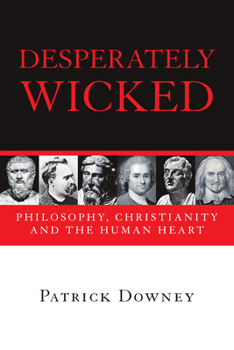Desperately Wicked: Philosophy, Christianity and the Human Heart
Select Format
Select Condition 
Book Overview
Patrick Downey explores the biblical writings of Genesis and the Hebrew prophet Jeremiah, the Greek tragedies, Plato, Aristotle, and political philosophers--such as Rousseau, Hobbes, Nietzsche and Ren Girard--to seek answers to the profound question, What is the human heart like?
Format:Paperback
Language:English
ISBN:083082894X
ISBN13:9780830828944
Release Date:February 2009
Publisher:IVP Academic
Length:182 Pages
Weight:0.75 lbs.
Dimensions:0.7" x 5.9" x 8.9"
Related Subjects
Christian Books & Bibles Ethics Religion Religion & Spirituality Religious Studies TheologyCustomer Reviews
1 rating
Can we be good?
Published by Thriftbooks.com User , 15 years ago
"The heart is deceitful above all things, and desperately wicked: who can know it?" (Jeremiah 17:9 KJV). Patrick Downey begins with Jeremiah's claim to lead his readers on a journey that lays bare the thoughts and intents of the heart. Various readings, political philosophy, Greek tragedy and the Bible serve to show what the heart wants, what it fears and why it lies. The author believes that "the desire to possess and the desire to be seen are what led us astray in the first place. To find our way back, we must pursue the desire to know, both ourselves and our true good." Our deceit is in how we see ourselves. I realized this in just reading the book. I don't doubt Jeremiah's words, and I can say with the Psalmist David, "My sin is ever before me." Yet, as I read Downey's thoughts on our desire to possess, which he shows is more than merely being materialistic, I saw how deceived I have been about keeping to myself. It's so far from that New Testament example of a young group of believers, who were "together and had all things in common." The author goes on to write about our desire to have good rather than to be good. Though many of us want to be good, Downey writes, "Most of us mean that we want to have the feelings that go along with being good." Downey's ability to make us see our true selves make this a searching and illuminating book. Along with a Bible, it will make a fine companion for spiritual inventory. It is not, however, an easy read. Some passages, especially the more philosophical ones, I had to read several times to try and understand what was being said. Readings from various sources are set apart in block format and are designed to supplement the text. Downey could have done better in tying this material to the topic under discussion. Most of the time it's up to the reader to discern the correlation. Academics and those schooled in philosophy will have an easier time digesting the material, but anyone willing to make the effort will at least find parts of this rewarding. One of those moments for me was when the author compares the "Romantic" Fall with the biblical Fall. The former is made to sound like the latter but is designed to replace it. The Fall of Romanticism looks back to a time when "we lived in a garden of delights as free, innocent and solitary animals, one with nature, and no self-consciousness." Can you see where this is going? "According to this Romantic telling, if there is to be any escape from the alienating ravages of this knowledge, it must come through the poetic return to nature we find in word or song or utopian politics (cf. John Lennon's song `Imagine')." It's back to the garden and a return to simplicity. As much as I value the arts and self-expression, I can see the subtle error of embracing these things as a universal panacea. They have their place, but the human heart needs much more than something that can only produce superficial change. The loftiest sentiments, the most honorable philo






